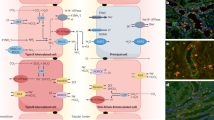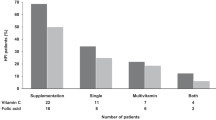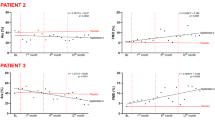Abstract
HEREDITARY fructose intolerance (HFI) is a genetically transmitted metabolic disorder known to be characterized biochemically by the virtual inactivity of hepatic fructose-1-phosphate aldolase1–3. Fructose-1 -phosphate (F-1-P), the initial reaction product of administered fructose, accumulates intracellularly behind this enzymatic defect4, much as galactose-1-phosphate (Gal-1-P) accumulates intracellularly behind the block of Gal-1-P uridyl transferase in galactosaemia5,6. The kinds and similarities of the metabolic and clinical abnormalities of patients with HFI and galactosaemia suggest that the cellular accumulation of hexose-1-phosphate is central in the pathogenesis of the multiple cellular disturbances of both disorders. Increased amounts of Gal-1-P were demonstrated in the kidneys, as well as in the liver, of two infants with galactosaemia diagnosed before death7. In both galactosaemia and HFI, a reversible hexose induced proteinuria and amino-aciduria have been reported8,9. Komrower et al.10 reported that in two infants with galactosaemia dietary restriction of galactose was followed by disappearance of the biochemical characteristics of renal tubular acidosis (RTA) (a clinical disorder of renal acidification characterized by minimal to absent azotaemia, hyperchloraemic acidosis and alkaline or minimally acid urine). Subsequent experimental ingestion of galactose (as milk) for 10 days by these children, however, did not result in the recurrence of hyperchloraemic acidosis. Mass et al. recently described a 41 year old woman with HFI and apparently long standing RTA which persisted after dietary restriction of fructose11. In three unrelated adults with HFI it has recently been demonstrated that the experimental administration of fructose immediately but reversibly subverts normal renal function into a state of tubular dysfunction with the biochemical and physiological characteristics of RTA and Fanconi's syndrome (impaired renal tubular reabsorption of alpha amino nitrogen, uric acid, phosphate and glucose)12,13. The tubular dysfunction occurred in the absence of the hypoglucosaemia characteristic of HFI. Because F-1-P aldolase is detectable in mammalian kidney14 and is presumably critical in the renal metabolism of F-1-P (ref. 15), the fructose-induced tubular dysfunction of HFI might be mediated by renal accumulation of F-1-P behind a defect of renal F-1-P aldolase.
This is a preview of subscription content, access via your institution
Access options
Subscribe to this journal
Receive 51 print issues and online access
$199.00 per year
only $3.90 per issue
Buy this article
- Purchase on Springer Link
- Instant access to full article PDF
Prices may be subject to local taxes which are calculated during checkout
Similar content being viewed by others
References
Hers, H. G., and Joassin, G., Enzymol. Biol. Clin., 1, 4 (1961).
Perheentupa, J., Pitkänen, E., Nikkilä, E. A., Somersalo, O., and Hakosala, J., Ann. Paediat. Fenn., 8, 221 (1962).
Froesch, E. R., Wolf, H. P., Baitsch, H., Prader, A., and Labhart, A., Amer. J. Med., 34, 151 (1963).
Milhaud, G., Arquiv. Brasil. Endocrinol. Metab., 13, 49 (1964).
Schwarz, V., Golberg, L., Komrower, G. M., and Holzel, A., Biochem. J., 62, 34 (1956).
Isselbacher, K. J., Anderson, E. P., Kurahashi, K., and Kalckar, H. M., Science, 123, 635 (1956).
Schwarz, V., Arch. Dis. Childh., 35, 428 (1960).
Komrower, G. M., Arch. Franc. Pédiat., 10, 185 (1953).
Froesch, E. R., Prader, A., Labhart, A., Stuber, H. W., and Wolf, H. P., Schweiz. Med. Wochenschr., 87, 1168 (1957).
Komrower, G. M., Schwarz, V., Holzel, A., and Golberg, L., Arch. Dis. Childh., 31, 254 (1956).
Mass, R. E., Smith, W. R., and Walsh, J. R., Amer. J. Med. Sci., 251, 516 (1966).
Morris, R., J. Clin. Invest., 44, 1076 (1965).
Morris, R. C., J. Clin. Invest., 45, 1048 (1966).
Wolf, H. P., and Leuthardt, F., Helvet. Chim. Acta, 40, 1033 (1957).
Froesch, E. R., in The Metabolic Basis of Inherited Disease (edit. by Stanbury, J. B., Wyngaarden, J. B., and Fredrickson, D. S.), 124 (McGraw-Hill, New York, 1966).
Sibley, J. A., and Lehninger, A. L., J. Biol. Chem., 177, 859 (1949).
Gornall, A. G., Bardawill, C. J., and David, M. M., J. Biol. Chem., 177, 751 (1949).
Author information
Authors and Affiliations
Rights and permissions
About this article
Cite this article
MORRIS, R., UEKI, I., LOH, D. et al. Absence of Renal Fructose-1-phosphate Aldolase Activity in Hereditary Fructose Intolerance. Nature 214, 920–921 (1967). https://doi.org/10.1038/214920b0
Issue Date:
DOI: https://doi.org/10.1038/214920b0
This article is cited by
-
Renal acidosis
Kidney International (1972)
Comments
By submitting a comment you agree to abide by our Terms and Community Guidelines. If you find something abusive or that does not comply with our terms or guidelines please flag it as inappropriate.



